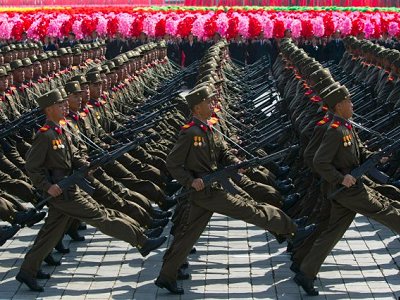
THE THINGS WE KNOW WE DON’T KNOW
Human rights campaigns usually find their feet with the creation of a figurehead that others can rally round; one pitiful country lacks such a person
There is something about North Korea that prevents most people from taking it seriously. The calculated sabre-rattling of the new regime in 2013 briefly achieved global recognition; when the goal of creating a hard-line image for Kim Jong-un (aka ‘the Great Successor’) had been met, the blood-curdling threats diminished and the media moved on.
Perhaps it is the retro communist kitsch of May Day parades, with impossibly choreographed goose-stepping soldiers, obscene and phallic missiles, nuclear lust, children beaming vacantly and the absurd cult of the Kim dynasty with its comic evocation of Stalinism that lowers our guard. The rituals and practices of North Korea seem a ridiculous replay of Soviet communism and are surely destined for the scarp-heap like they. An obsessively centrally-planned economy, founded on the historic philosophy of Juche, or self-reliance, cannot survive long in our networked world.
It is probable that the regime will collapse under the strain of its own iniquity in due course, but this event is likely to be bloody and dangerous. For those of us who live in the West, this holds much less fear than it does for South Koreans (Seoul is only a short car journey from its neighbour) or Japan; China would also bear the brunt of the catastrophe. For those who do not have to spend sleepless nights planning for this eventuality, it is easy for the plight of North Koreans to slip from our attention. George W. Bush made it one point on his axis of evil after 9/11 and this reason alone is sufficient for many weary of the neo-conservative era to dismiss it from mind, yet this would be wrong.
It is incredibly hard to take the pulse of ordinary North Koreans because access to them is so strictly regulated. Few journalists or foreigners are permitted to travel outside Pyongyang and as the city is almost exclusively populated by the families of the government and military elites, even a tour of the capital is not illuminating, for these people are winners in the cult of Kim. Yet stories are being told and they are heart-breaking. Barbara Demick’s book Nothing to Envy: Real Lives in North Korea (winner of the Samuel Johnson prize for non-fiction) charts with subtle power and in sparing prose the plight of North Koreans, the famine in the 1990s and their desire to do such ordinary things like falling in love and finding gainful employment. With a journalist’s gift for allowing people to tell their stories without commentary, she shows to the world how like the rest of us the people of this benighted country are – not that we would think it from the forbidding image it presents to the world.
While we parse what human rights mean in the West, the North Korean regime is guilty of unimaginable atrocities and in August 2013, the first UN Panel into North Korea’s record began hearing testimony from refugees. As Victor Cha observes in The Impossible State: North Korea past and future: ‘when North Korea collapses, the gulags will be revealed as one of the worst human rights disasters in modern history’. There are between 200,000 and 300,000 poor souls incarcerated in this inhuman network of camps but we know almost nothing about them. What testimony has emerged is so unspeakable that I would not want to distress people by relating it here, but people are suffering as we breathe.
Many North Koreans flee to China but Beijing refuses to treat them as political refugees, fearing the chaos of a large influx; instead they are routinely sent back over the border in curtained vehicles and immediately transferred to the gulags where they are asked three questions: Why did you leave? Did you contact any South Koreans? Did you go to a church? According to Victor Cha, former advisor to the White House on the region, those who answer the latter two questions affirmatively are ‘harshly tortured, as part of “re-education”’.
Human rights campaigns find their potency in the media age by the creation of a figurehead that others can rally round. Nelson Mandela, Aung San Suu Kyi, Vaclav Havel and Lech Walesa are prime examples of this trend in the modern era; men and women who understood the power of symbolism in tackling racism, military and Marxist dictatorships. The tragedy of North Korea is that vicious repression of the individual and the ability to conceal their suffering from the surrounding world means the international community lacks an icon to stimulate concern; there may well be an Alexander Solzhenitsyn in the camps, but they remain anonymous.
There are trendier human rights causes in the world than the gulags of North Korea but few that should press upon our hearts as much. It may rarely be in our news, but the inability to visualise it should not inhibit our prayers. North Korea is not an indistinguishable collective serving the lusts of a despicable regime; it is made up of individual people with names and aspirations, like you and me. One day their stories will tumble out and we will be glad we prayed for them.
POPULAR ARTICLES

Obama's Covert Wars
The use of drones is going to change warfare out of all recognition in the next decades.

Through A Glass Starkly
Images of traumatic incidents caught on mobile phone can be put to remarkable effect.

What Are British Values?
Is there a British identity and if so, what has shaped the values and institutions that form it?


